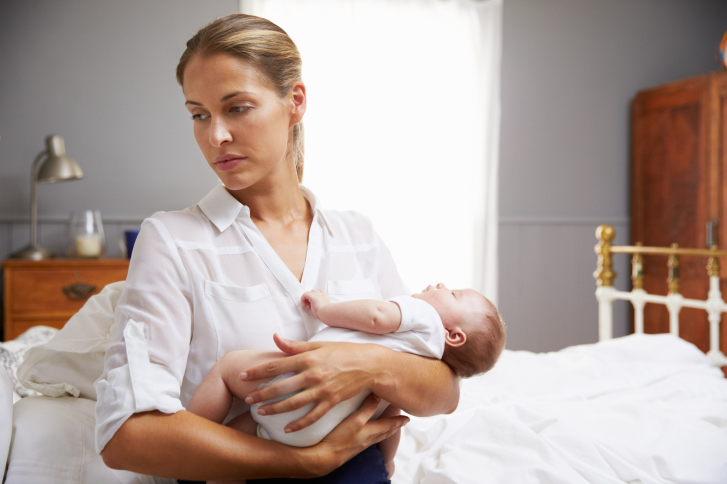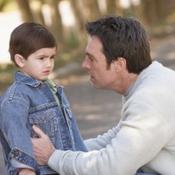 Many years ago, before I had children, I worked with a parent who confided that she would sometimes get so frustrated with her baby that she fantasized about throwing him out the window. I was horrified to hear this, and thought there was something really troubled about this parent—that is, until I had my own (colicky) baby and began to have similar fantasies.
Many years ago, before I had children, I worked with a parent who confided that she would sometimes get so frustrated with her baby that she fantasized about throwing him out the window. I was horrified to hear this, and thought there was something really troubled about this parent—that is, until I had my own (colicky) baby and began to have similar fantasies.
Just to be clear, neither this parent nor I was going to hurt anyone. There is a world of difference between fantasizing and acting. But our feelings of frustration and hate were very real and powerful. And we are not alone. Having had the pleasure of both participating in and leading several parenting support groups over the years, I can tell you that many parents have feelings of hate or other strongly negative feelings toward their kids at one time or another.
So, if hating our children is so ubiquitous, why isn’t it more openly acknowledged?
We have all heard (ad nauseam) about the positive feelings we are supposed to cultivate in ourselves and express toward our children, feelings such as patience, acceptance, unconditional love, pride, etc. Rarely, though, do we hear about the validity of feeling hate or other strongly negative feelings toward our children.
Fortunately, this has shifted somewhat in the past decade or so. The proliferation of parent support groups where the expression of negative feelings is accepted and supported, and the publication of books such as the satirical parenting guides Sh*tty Mom: The Parenting Guide for the Rest of Us by Laurie Kilmartin, et al., Toddlers Are A**holes: It’s not Your Fault by Bunmi Laditan, and the faux children’s book Go the F**k to Sleep by Adam Mansbach and Ricardo Cortes, have helped normalize parents’ negative feelings. Despite these advances, however, a culture of secrecy and shame around hating our kids persists.
In order to understand why this is, it might be helpful to first look at the question of why we hate our kids.
To some extent, it’s just common sense: spending hours upon hours, days upon days, years upon years taking care of someone who is dependent on you, but often demanding and resentful of you, naturally breeds some negative feelings.
For a more in-depth look at parental hate, Donald Winnicott (a psychoanalyst and coiner of the phrase “the good enough mother”) explained it best when he gave the following reasons (among others) as to why a mother might hate her baby (1975; p. 201).
- The baby is a danger to her in pregnancy and in birth.
- The baby is an interference with her private life.
- The baby hurts her nipples even by suckling, bites her, and tries to hurt her in other ways.
- The baby can be ruthless, treats her like scum, an unpaid servant, a slave.
- The baby at first must dominate, life must unfold at the baby’s rate, and all this needs the mother’s continuous and detailed study.
- After an awful morning with her baby, when the mother goes out with him/her, s/he smiles at a stranger who says: “Isn’t s/he sweet?”
And yet, Winnicott goes on, for all the hate the mother may feel toward her baby, she must learn to tolerate this feeling without acting on it or expressing it in its raw, rageful form (p. 202). In short, mothers—and I would add fathers, too—must contain their feelings of rage. Perhaps it is this need for containment and the challenges this task poses that explains why parental hate is still somewhat taboo.
But what does it even mean to contain one’s negative feelings toward one’s child? And why is it so important?
I would argue that containment is achieved when parents are able to accept and integrate into their emotional landscape, at least to some extent, their negative feelings toward their children. Generally, when we fail to accept our negative feelings toward our children, we act in one of two ways: we become rageful or we withdraw emotionally, either of which can be problematic.
When we rage at our children, we give them the message that we are not in control of our negative feelings, that negative feelings are scary and bad, and that any such feelings they have should be expressed in a similar way, or hidden away because they are too scary.
Alternatively, when we cut ourselves off from our negative feelings or hide them away such that we don’t have access to and don’t express them to our children, our children get the message that negative feelings are unacceptable and wrong and that when they feel and/or express negative feelings, they are bad for doing so. Having negative feelings becomes a scary, lonely, and powerless experience.
So, if we aren’t supposed to act on or hide our hateful feelings toward our kids, what the heck do we do with them?
As I suggested above, the first step is to accept them, to not feel ashamed of them, to understand that they are valid. In this way, we come to integrate these feelings into the rest of who we are and what we feel. In practice, this might mean sharing our feelings with other parents, complaining about or talking trash about our kids to others, or maybe speaking with a counselor or therapist—release! Often, this is enough for us to feel sane and in control and to contain our negative feelings in a way our child needs.
Sometimes, though, it is not enough for us to calmly hold our negative feelings without expressing them. Sometimes our children need to feel our hate or negative feelings toward them—not necessarily in their raw form, but in a controlled way.
Why is this? Why do our children ever need to experience our hate toward them?
How Psychoanalysis Can Inform Parenting
Once again, I believe Winnicott explained it best when he stated (1975): “It seems doubtful whether a human child as he develops is capable of tolerating the full extent of his own hate in a sentimental environment. He needs hate to hate.” (p. 202)
Hyman Spotnitz, founder of modern psychoanalysis, a branch of psychoanalysis, elaborated on Winnicott’s thesis when he wrote about the relationship between the therapist and the person in therapy. In psychoanalysis, it is believed that the relationship between the person in therapy and the therapist inherently evokes feelings from the former’s past (and sometimes the therapist’s, too), particularly with regards to the relationship to his or her parents. When evoked in the context of the psychoanalytic relationship, certain powerful feelings can arise in the person toward the therapist and the therapist towards the person in therapy, including feelings of hate.
Although he cautioned against expressing all of one’s feelings toward the people one works with in therapy, Spotnitz warned against the therapist always hiding his negative feelings (2004). He wrote, “To allot too little hate to a patient who needs to learn to experience and sustain it comfortably is unjust. To give him too little feeling because the analyst has too much of it is a technical error. The patient is entitled to whatever feeling—positive or negative—he needs …” (p. 159)
Spotnitz further writes (2004) that the therapist needs to express his hatred in order to help the person in therapy experience and sustain his or her own negative feelings. In this way, the therapist helps the person feel less alone with his or her hate, feel that the therapist is more like him/her, with a more equitable balance of goodness and badness (that is, the person is not all bad for his or her negative feelings, and the therapist not all good for not expressing his/hers).
Spotnitz also suggests (2004) that the sharing of the therapist’s hate can reassure the person in therapy of his or her impact on the therapist, giving the person a sense of control and power. Furthermore, when the therapist expresses negative feelings to the person, the person can see that the therapist’s verbal expression does not necessarily lead to action, the therapist thereby modeling for the person the importance of putting feelings into words rather than acting out.
While I do not advocate being therapists to our children (in fact, I strongly caution against it), I would argue that many of the beliefs of psychoanalysis more generally, and modern psychoanalysis specifically, very much apply to parenting. We need to try to accept and integrate our feelings of hate and other negative feelings toward our children so that we can contain them and, when appropriate, choose to express them to our children in a controlled fashion. In this way, our children can see that we have powerful, negative feelings, too, and that they are not alone with their scary, hateful feelings and are not bad for having them. We let our children know that despite how powerless they feel at times, they do have some power in being able to affect us and stir up powerful feelings in us. We help our children accept and integrate their own hate, so that it becomes one of many feelings they can experience and express, not one that is split off and acted out because of fear or shame.
In short, sometimes our hate can be helpful to our kids.
So, what does “helpful hate” look like in practice?
How Hate Can Be Helpful
To illustrate, I recount a situation with a parent, whom I shall call Angela, who was a member of one of my parenting groups.
Angela was a parent of two—a 6-year-old girl, whom I will call Josephine, and a 3-year-old boy whom I will call Sam. Josephine had been a very easy baby and toddler; she had a calm temperament and was well-behaved. Angela felt confident and competent in her parenting of Josephine.
It was therefore a bit of a surprise and disappointment to Angela when Sam was born and turned out to be a very difficult baby and toddler. Much more physically developed than verbal, Sam would get frustrated when he didn’t get his way and couldn’t express himself, and would often hit Angela, quite hard, to express his frustration. Angela would become enraged and scream at Sam when he hit her. Sam, in turn, became very scared and would start sobbing inconsolably, at which point Angela would feel so guilty that she would apologize profusely and try to comfort Sam, to no avail. Unfortunately, this became a cycle, with Angela and Sam clearly both very upset about what was happening between them, but with the hitting and screaming continuing.
As parents, when we learn how to do these things, we become more comfortable with who we are and what we feel, and can therefore be more in control and more deliberate in our parenting choices. And all this helps us be the best parents we can be, no matter what we are feeling toward our children.
When Angela spoke in the parenting group about this dynamic, she expressed deep shame about her rage and her screaming and the cycle in which she and Sam were engaged. She so desperately wanted to be in control and to figure out a way to break the cycle.
After several weeks of discussing her predicament, one of the other members of the group blurted out, “Sam’s a terror! Of course you want to scream at him! It’s a miracle you don’t hit him back!” Angela looked stunned, but then burst out laughing, as did the rest of the group.
It seemed that something had been liberated in Angela. She had finally been given permission to accept her strongly negative feelings toward Sam. Little by little, Angela was able to discuss and accept her more negative feelings—her disappointment that Sam wasn’t easier like his sister, her anger at Sam for leading her to feel like an inadequate parent, and much more.
Over time, these feelings stopped being so scary and shameful to Angela. As Angela became more accepting of her negative feelings, her rage began to dissipate, and when Sam hit her, she often felt “simply” angry rather than enraged. Angela began to feel more in control of her feelings and more able to focus on what to do with Sam in a less reactive, guilty way.
Over time, Angela’s yelling at Sam began to decrease. Rather, when Sam hit her, Angela would firmly and somewhat angrily tell Sam to stop, that she knew he was mad but that hitting was not OK, that if he was mad, he could yell “No!” or “I’m mad!” She would then send Sam to his room for a time-out.
It seemed to have the desired effect. Over time, Sam’s hitting greatly decreased and his use of the words “no!” and “mad!” greatly increased. It would seem that, for both Sam and Angela, negative feelings had become more acceptable, more integrated parts of who they were and how they interacted with each other.
Although it is impossible to know what Sam’s subjective experience of all this was or even to be sure what aspect of Angela’s approach was effective, I would speculate that because of the changes in Angela’s feelings and actions, she was able to accomplish at least some of the following:
- Help Sam feel that his negative feelings had an impact on Angela but were not bad or overwhelming.
- Set the limit, “Hitting is not OK; you need to go to your room,” so that Sam felt his anger was being contained, which helped him feel safe.
- Give Sam alternative forms of expression, i.e. words, to teach Sam how to express his strong feelings rather than act out on them.
Of course, there are times when this type of approach doesn’t work for a variety of reasons. Hey, nothing works all the time in parenting. We are human; we lose control; our kids lose control. And certainly, many parents are perfectly capable of handling their hatred and other negative feelings without the help of psychoanalysis.
Nonetheless, what I think is unique about psychoanalysis and what it can contribute to parenting is its ability to help people learn about and accept all their feelings, both positive and negative, and to show people what to do with their feelings (contain, express, etc.), particularly the more difficult ones such as hate.
As parents, when we learn how to do these things, we become more comfortable with who we are and what we feel, and can therefore be more in control and more deliberate in our parenting choices. And all this helps us be the best parents we can be, no matter what we are feeling toward our children.
References:
- Kilmartin, L., Moline, K., Ybarbo, A., & Zoellner, Mary Ann. (2012). Sh*tty Mom: The Parenting Guide for the Rest of Us. Harry Abrams.
- Latidan, B. (2015). Toddlers Are A**holes: It’s not Your Fault. Workman Publishing Company.
- Mansbach, A., & Cortes, R. (2011). Go the F**k to Sleep. Akashic Books.
- Spotnitz, H. (2004). Modern Psychoanalysis of the Schizophrenic Patient. YBK Publishers.
- Winnicott, D.W. (1975). Hate in the Countertransference. Through Pediatrics to Psychoanalysis, pp. 194-203. New York: Basic Books.

The preceding article was solely written by the author named above. Any views and opinions expressed are not necessarily shared by GoodTherapy.org. Questions or concerns about the preceding article can be directed to the author or posted as a comment below.

 Just Say No? A Guide to Setting Limits with Your Child
Just Say No? A Guide to Setting Limits with Your Child When You Love Your Kids but Don't Love Motherhood
When You Love Your Kids but Don't Love Motherhood 5 Parenting Secrets for Improving Your Child's Behavior
5 Parenting Secrets for Improving Your Child's Behavior

